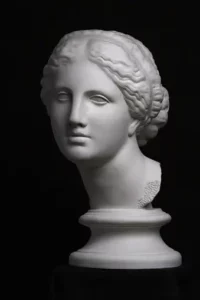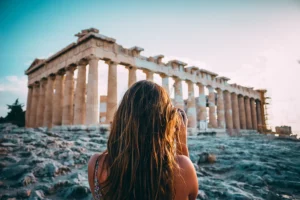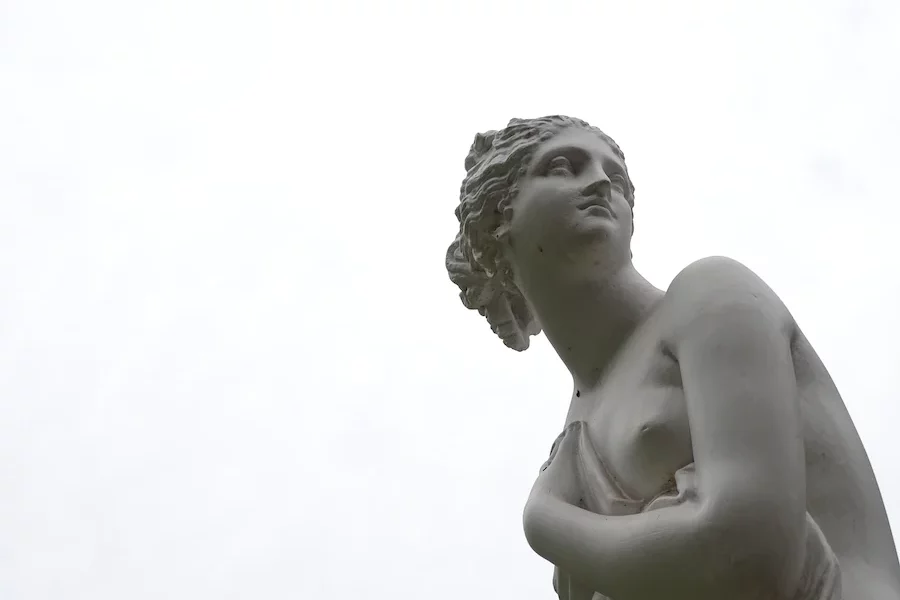Hello lovelies!
Ancient Greece is famous for its many inventions, its philosophers, its fascinating mythology, and its fabulous buildings.
But did you know that Ancient Greece was also a society where beauty was a top quality to have? And that’s not so surprising since they invented the gold number for beauty…
Whether you watch statues of goddesses or read philosophical treaties, beauty was everywhere. Indeed, being kallòs (beautiful) was a requirement for both men and women.
Consequently, women translated this high conception of beauty in their daily rituals. Let’s discover Ancient Greek beauty secrets today!
Disclaimer: This post contains affiliate links to help me support this blog. I may earn a commission whenever you click on the links and purchase the products, with no additional cost to you. Thanks in advance for your support!
What was the conception of beauty in Ancient Greece?

“When a beautiful soul harmonizes with a beautiful form, and the two are cast in one mould, that will be the fairest of sights to him who has the eye to contemplate the vision” – Plato
Ancient Greeks loved physical beauty and revered Aphrodite, the goddess of beauty and love. Other goddesses and women were renowned for their beauty as well, such as Helen of Troy. Painters and sculptors represented them with long flowing hair and a radiant skin.
Thus, they always tried to improve their appearance through natural ways: diet, exercise, and natural cosmetics.
Speaking of cosmetics, they were a very important part of Ancient Greeks’ lives. Indeed, the word “cosmetics” comes from the Greek word kosmetikos, deriving from kosmos. This conveyed an idea of harmony, balance, and divine order. Beauty was revered as divine and had to be daily entertained.
Consequently, Ancient Greeks relied on natural cosmetics that they found in their natural environment. They include many ingredients that they ate daily as well.
Everything You Need To Know About Ancient Greek Beauty Secrets

Ancient Greek Beauty Secret #1: Olive oil as a moisturizer
The poet Homer referred to olive oil as “liquid gold”. Olive oil was a staple that was used in the kitchen as well as in the daily beauty rituals of women. This ancient beauty secret was a first-class moisturizer in every household. Also, Ancient Greek women used it to make their skin and hair look shiny and healthy.
Olive oil is a natural source of healthy fats, antioxidants, and vitamins. It revitalizes dry skins while boosting the cell renewal process.
Ancient Greek Beauty Secret #2: Milk and yoghurt
Dairy products were a daily staple in the diet of Ancient Greeks. However, milk and yoghurt were also beneficial because of their softening properties. Rich people especially relied on milk from donkeys to keep a glowing skin. Otherwise, they could also used milk from goats and cows.
Also, Greek yoghurt was a miraculous ingredient to treat certain skin ailments such as sunburns. Yoghurt has a unique combination of lactose, proteins, vitamins, and minerals.
Thus, it has soothing and nourishing properties. Consequently, it is perfectly understandable that Ancient Greek women used yoghurt to cure their sunburns!
Today, the cosmetic industry still uses yoghurt in their products, such as the Greek Yoghurt Nourishing Probiotic Gel Cream by Korres.
Ancient Greek Beauty Secret #3: Flowers and herbs
Ancient Greeks used many herbs, flowers, fruits, and vegetables in their cosmetic recipes. In particular, they considered rose as the “queen of flowers”.
For instance, they would use rose oil to soothe and moisturize dry skin. Also, rose water was a key cosmetic staple to cleanse and hydrate the skin of Ancient Greek women.
Containing vitamins A and E, rose water is extremely nourishing and helps to reduce wrinkles. Also, it is also useful to tighten skin pores.
Among the other herbs used by Ancient Greeks, you have:
- anemones
- mulberries
- lotus flowers
- marigolds
- lavender
- chamomile
- cypress
Ancient Greek Beauty Secret #4: Sea salt
Just like Ancient Egyptians, Ancient Greeks relied on a mixture of sea salt and olive oil to exfoliate their skins. They followed their exfoliation ritual with a bath to soothe their skin.
Moreover, they would soak in seawater as a therapy to relax their bodies and minds. This practice is the ancestor of what is called “thalassotherapy” nowadays.
Rich in minerals, sea salt has many properties for the skin. Indeed, it increases blood circulation and has antiseptic effects. Moreover, sea salt is a natural detoxifier since it helps absorbing toxins from the skin.
Ancient Greek Beauty Secret #5: Honey
Like dairy products and olive oil, honey had been an ancient beauty secret of Greece since 5,000 BCE. They used honey primarily as a face mask.
Also, they would use honey and milk in their bath to nourish their skin, like the Ancient Egyptians. In particular, Cleopatra was a huge fan of this recipe! Honey has anti-inflammatory properties and helps to get rid of dead skin cells.
Ancient Greek Beauty Secret #6: Pomegranate
Pomegranate was a favorite fruit of Aphrodite, and was a symbol for fertility and good luck. Ancient Greeks used pomegranate juice to cleanse their pores and balance their oily skin.
Beauty Secret #7: Lethal make-up
Ancient Greek women favored light skin as it was a symbol of high status and class. Therefore, they relied on makeup to enhance their beauty. Prostitutes (hetaires) had a bolder look, with an outrageous make-up. On the contrary, prestigious women sported a more natural look.
However, their make-up was lethal because they used a cosmetic recipe created by a Greek philosopher called Theophrastus of Eresos. He used a recipe with ceruse or lead carbonate to lighten women’s skin.
Lead is extremely toxic and as expected, many women faced health problems – and even died. Fortunately, the authorities banned the use of lead in cosmetics in the 19th century.
Beauty Secret #8: A balanced diet
Did you know that the diet of Ancient Greeks was part of their ancient beauty secrets? Indeed, they relied on a very healthy Mediterranean diet to sustain their bodies on a daily basis.
They would eat lots of vegetables, seasonal fruits, fish, olive oil, cereals and grains, and legumes. They ate little amounts of meat and drank lots of wine.
Summary: what were the most important Ancient Greek beauty secrets?

Ancient Greek beauty secrets are surprising because they are extremely up to date. Indeed, they relied on a combination of natural cosmetics, diet, and exercise to make the most of their physiques. And women used ingredients straight from the kitchen that you can still use today.
Well, that’s all for today! What do you think of the Ancient Greek beauty secrets? Do you use them in your beauty routine? Share your thoughts in the comments below!
Take care!
Want more content from me? Join my newsletter today and received the latest updates of my website. Also, you’ll receive a wonderful gift in your email!





It’s truly fascinating to uncover the beauty rituals of Ancient Greece.
As a reader, I’m amazed by how these ancient practices have stood the test of time and continue to hold relevance in today’s world.
The emphasis on natural ingredients like olive oil, yogurt, and herbs for skincare resonates with the growing interest in holistic and organic approaches to beauty.
Learning about the historical significance of these practices, such as the use of rose water and pomegranate, adds a layer of cultural depth to the concept of self-care.
The cautionary tale of the lethal makeup is a stark reminder of the lengths people once went for societal ideals of beauty.
Overall, this article has provided a unique perspective on beauty that transcends eras and sheds light on the enduring pursuit of enhancing one’s appearance naturally.
I’ll be sure to have my wife read the article, as well!
Thanks!
It’s fascinating to peek into the world of Ancient Greek beauty standards and rituals. The reverence for beauty in that society is evident through their adoration of goddesses like Aphrodite and the pursuit of physical allure. Stunning!
The use of natural ingredients for beauty help, like olive oil for moisturizing and pomegranate juice for balancing oily skin, is both surprising and remarkably relevant today. It’s intriguing how their emphasis on a balanced diet and exercise as beauty secrets also reflects a contemporary understanding of well-being.
Sea salt is definitely a favorite ingredient of mine for soothing bath and body treatments!
Thanks for your comment Aly !
Exploring the enchanting world of ancient Greek beauty practices is truly captivating. Unveiling these timeless secrets reveals a connection between history and modern skincare. The wisdom of using olive oil for radiant skin and honey for hair resilience is inspiring. Embracing these natural remedies brings a touch of antiquity to our modern routines, inviting us to rediscover the beauty rituals of the past.
Thanks for your comment !
Very delightful article on beauty, absolutely a must that we take care of our bodies both on the outside and in. I will definitely look more in to Mediterranean diet as well as the Pomegranate and Rose water. Beauty products does not have to be expensive, just effective. In other areas of the world with most cultures, all they know is what’s naturally good for our bodies. I get pieces of valuable information from all over and this read has just been added to my list, thank you.
You’re welcome Tameka!
I never thought of diet as one of those things the ancient Greeks adored for beauty. I always felt they were a product of ornament. But from your list, they have high value for vegetables, honey, salt, natural oil and a good eating habit. It is also reflected in their lifestyle and longevity. Without missing words, it is worth emulating.
Yes indeed!
What a fascinating read! Exploring the beauty secrets of Ancient Greece opens up a whole new world of natural and time-tested methods. From olive oil’s versatile benefits to the cultural significance of sea salt bathing rituals, these insights offer a refreshing perspective on beauty. It’s incredible how these age-old practices continue to resonate today. A wonderful reminder that simple, holistic approaches often stand the test of time. Truly enjoyed discovering these surprising Greek beauty secrets!
Thanks for your comment! I’m glad you enjoyed my article…
Hey Elodie,
Many thanks for this post, you have provided excellent, detailed information about the Ancient Greek’s processes and rituals in regard to health and beauty.
What I love is how in tune they were with nature, the natural remedies they had around them, and used it all to the fullest.
Many of these health benefits we still use, but many have been long forgotten.
Like you, I’m a huge believer in God’s pharmacy i.e. gifts from nature that are so good for us and how we can use these gifts to nourish our bodies, both inside and out.
Thank you again for such a great article.
Cherie :o)
Thansk for your sweet comment Chezstar!
I believe these beauty secrets of ancient Greeks are still applicable to our present lives, although the natural ingredients have been incorporated to the body lotions, soap, cosmetics, etc. with additional preservatives already.
But nothing beats the natural ingredients and food.
I personally love to eat fruits and veggies for soft and healthy skin and body, with some vitamin supplements.
Yes, proper diet, enough sleep, regular exercise and enough rest will make us healthy and naturally beautiful everyday.
Marita
Yes indeed! And thanks for your comment Marita!
I really enjoyed reading this article. It was very enlightening and informative. Beauty and the care of the human body have been a constant concern of many cultures throughout history. Some of them, such as the ancient Greeks, have excelled in cultivating beauty and using natural elements for their care, leaving a valuable legacy that we can take advantage of and apply today.
I admire how the ancient Greeks had such a sophisticated and natural approach to beauty and how they used various natural products to take care of their physical appearance. The eight secrets you shared in this post are fascinating and easy to access.
Thank you for revealing these amazing ancient Greek beauty secrets.
You’re welcome! Thanks for your comments!